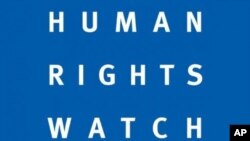An international rights watchdog group says British police must stop using what it says are ineffective stop-and-search methods to fight terrorism. Human Rights Watch says ethnic minorities are disproportionately targeted and that undermines the fight against terrorism.
Human Rights Watch Europe and Central Asia Division Deputy Director Benjamin Ward says the law has led to 450,000 stops and searches between April 2007 and April 2009.
"The power is supposed to be for the purposes of preventing terror," Ward said. "But there has not been a single successful prosecution arising out of one of these stops."
An anti-terrorism law passed in 2000 gives police in Britain the right to stop and search anyone they may "reasonably suspect to be a terrorist."
Earlier this year the European Court of Human Rights upheld a complaint against the practice. It said searching people without clear grounds for suspicion violated privacy rights. The court also said there were not adequate safeguards against abuse of the powers.
Last week the court rejected an appeal by the British government against that ruling.
Britain's Home Office says the powers are used as part of a broad anti-terrorism strategy and prevents would-be terrorists from carrying out surveillance or carrying explosives or weapons.
But Human Rights Watch says police use the power improperly.
"We have seen examples of it being used to stop photographers, to stop children, and perhaps much more worryingly, we have also seen clear evidence of members of ethnic minority communities - Asian and black people - being stopped in much higher numbers than their proportion in the population would suggest," Ward said.
Ward says ethnic minorities are disproportionately targeted and that has negative consequences in the fight against terrorism. "It has alienated communities whose cooperation and support is actually necessary to disrupt plots and crack conspiracy," he said.
Human Rights Watch says the number of stop and searches has gone down in the past year, largely because police in London have used the powers less.
Britain's new coalition government, which was elected in May, says it will review the country's counter-terrorism legislation. A spokesperson said that would include a review of stop-and-search powers.
HRW Calls for British Government to Scrap Terrorism Search Powers







